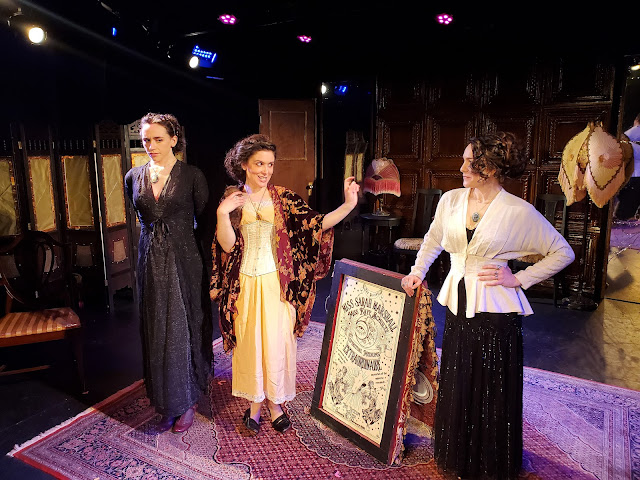Ectoplasm
Written and directed by Sara Fellini
115 MacDougal St., Manhattan, NYC
January 13-February 6, 2022
 |
| Sophia Radix, Adam Belvo, Caitlin Dullahan-Bates, Jillian Cicalese, Kelsey Bentz, Raina Silver, Florence Scagliarini. photo by Federico Mostert |
Ectoplasm, a new play from Sara Fellini, who also directs, begins with one woman alone on stage and ends with another. The first is Kaye Schultz (Caitlin Dullahan-Bates), who enters to the plaintive music of indie band Lord Huron and a somewhat cheeky admonition to reflect on universal mortality; and the second is her partner in an early twentieth-century Spiritualist business, medium Sara Marshall (Jillian Cicalese). Over the course of one entertainingly eventful soirée featuring the pair, the revelations come not only from the spirit world. |
| Caitlin Dullahan-Bates, Florence Scagliarini, Jillian Cicalese. Photo by Adam Belvo |
The gathering occurs at the home of Madame Francine Montfort (Florence Scagliarini), an outspoken and idiosyncratic female analog of Lord Byron—although she herself maintains that there are important differences—attended by the dryly funny Callum Holes (Drew Reilly), recently promoted to butler. In addition to Sara and Kaye, in attendance are Houdini-esque magician and skeptic Ira Orinthall (Adam Belvo) and his suffragist wife, Annette (Sophia Radix), along with parapsychologist George Crookes (Kelsey Bentz) and his bunny-loving, blood magic-practicing wife Miska (a charismatic Raina Silver). Unaccompanied and late to the party is famous explorer (and actual historical figure) Elisha Kane (Federico Mostert). The evening at Mme Montfort's is punctuated by Sara's Spiritualist sessions, conducted both
en masse and privately, the latter of which provide insights into the living as well as the dead. And throughout, as important as any supernatural currents, desire flows across lines of class and gender, concealed and declared, requited and rebuffed (Bentz taking the part of George adds some extradiegetic queerness to this mix as well).
 |
| Jillian Cicalese and Adam Belvo. Photo by Sara Fellini |
On the whole,
Ectoplasm keeps the tone light, but amidst the witty repartee and flirtation, it seeds weightier moments and concerns. Dullahan-Bates, Cicalese, and Scagliarini in particular share poignantly performed moments among themselves in various combinations, and the intensity that Belvo brings to the scene of Ira's private reading deserves mention as well. The play cleverly nods to the blurring of lines between magic and technological progress, and when Sara accuses Ira of harassing women in their places of business, it highlights the similarity between their conflict and historical conflicts between doctors and midwives/wise women/witches, even as Ira expresses a basically commendable motivation for his mission to debunk mediums. Sara's power is represented as simultaneously a gift, a curse, and a calling, with differences in viewing it (and belief more broadly) exposed and explored not only between, as one would expect, Sara and Ira but also between Sara and Kaye. The set design, with its dark wood paneling and small proscenium, and some effective uses of light and shadow produce a fitting atmosphere, perfectly enhanced by Lord Huron's and Carolina Eyck's music.
In the context of Fellini's play, the titular ectoplasm, the sticky residue of an intimate kind of communication, might be seen to accrue some symbolic resonance. Adroitly knitting the otherworldly to the inner-worldly,
Ectoplasm summons forth a beguiling manifestation.
-John R. Ziegler and Leah Richards






Comments
Post a Comment